|
|
|
Sort Order |
|
|
|
Items / Page
|
|
|
|
|
|
|
| Srl | Item |
| 1 |
ID:
145695
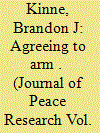

|
|
|
|
|
| Summary/Abstract |
This article assesses the impact of a new form of defense cooperation – formal weapons cooperation agreements, or WCAs – on the global arms trade. WCAs are bilateral framework agreements that establish comprehensive guidelines on the development, production, and exchange of conventional arms. Substantively, WCAs regulate such core areas as procurement and contracting, defense-based research and development, and defense industrial cooperation. These agreements have proliferated dramatically since the mid-1990s. They now number nearly 700, with 30–40 new WCAs signed each year. Newly collected data are used to analyze the effect of WCAs on import and export of conventional weapons. To control for interdependencies in the formation of WCAs, and to account for the mutually endogenous relationship between WCAs and weapons flows, WCAs are modeled as an interdependent network that coevolves with the individual-level arms trade activity of states. The analysis shows that, over the 1995–2010 period, WCAs have significantly increased weapons flows.
|
|
|
|
|
|
|
|
|
|
|
|
|
|
|
|
| 2 |
ID:
168552
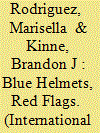

|
|
|
|
|
| Summary/Abstract |
United Nations peacekeeping soldiers commit atrocities while deployed despite their mandate to protect civilians from harm. Yet, there is tremendous variation across missions in reported human rights abuses. Why are some missions more susceptible to misconduct than others? To answer this puzzle, we identify three broad sources of influence on peacekeeper behavior: institutions, society, and military culture. Using newly collected data, we find that host-country and contributing-country institutions, particularly press freedoms and rule of law, dramatically decrease violations. Compliance with international humanitarian law also decreases violations, though to a lesser degree than institutions. Societal influences, such as gender norms and income inequality, have virtually no impact on abuses. We illustrate the utility of these findings by generating out-of-sample predictions for hypothetical peacekeeping missions in countries with recent political turmoil.
|
|
|
|
|
|
|
|
|
|
|
|
|
|
|
|
| 3 |
ID:
172339
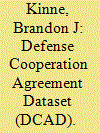

|
|
|
|
|
| Summary/Abstract |
The academic study of defense cooperation focuses heavily on formal military alliances. Yet, governments rarely sign new alliances, and the global alliance structure has remained relatively static for decades. By contrast, governments are increasingly active in defense cooperation agreements (DCAs). These bilateral framework treaties institutionalize their signatories’ day-to-day defense relations, facilitating such wide-ranging activities as defense policy coordination, joint research and development, weapons production and arms trade, joint military exercises, training and exchange programs, peacekeeping, and information exchange. Nearly 2,000 DCAs have been signed since 1980. Preliminary evidence suggests that DCAs impact numerous security, military, and defense outcomes and that governments increasingly incorporate DCAs as core elements of their security strategies. This article introduces the new DCA Dataset (DCAD). I provide a brief historical background on DCAs and compare them to other commonly studied forms of defense cooperation. I then explain coding standards and describe the data set in detail. Finally, I illustrate applications of DCAD to militarized interstate disputes and arms trade.
|
|
|
|
|
|
|
|
|
|
|
|
|
|
|
|
| 4 |
ID:
162514


|
|
|
|
|
| Summary/Abstract |
Bilateral defense cooperation agreements, or DCAs, are now the most common form of institutionalized defense cooperation. These formal agreements establish broad defense-oriented legal frameworks between signatories, facilitating cooperation in such fundamental areas as defense policy coordination, research and development, joint military exercises, education and training, arms procurement, and exchange of classified information. Although nearly a thousand DCAs are currently in force, with potentially wide-ranging impacts on national and international security outcomes, DCAs have been largely ignored by scholars. Why have DCAs proliferated? I develop a theory that integrates cooperation theory with insights from social network analysis. Shifts in the global security environment since the 1980s have fueled demand for DCAs. States use DCAs to modernize their militaries, respond to shared security threats, and establish security umbrellas with like-minded states. Yet, demand alone cannot explain DCA proliferation; to cooperate, governments must also overcome dilemmas of mistrust and distributional conflicts. I show that network influences increase the supply of DCAs by providing governments with information about the trustworthiness of partners and the risk of asymmetric distributions of gains. DCAs become easier to sign as more states sign them. I identify two specific network influences—preferential attachment and triadic closure—and show that these influences are largely responsible for the post-Cold War diffusion of DCAs. Novel empirical strategies further indicate that these influences derive from the proposed informational mechanism. States use the DCA ties of others to glean information about prospective defense partners, thus endogenously fueling further growth of the global DCA network.
|
|
|
|
|
|
|
|
|
|
|
|
|
|
|
|
| 5 |
ID:
133643
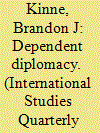

|
|
|
|
|
| Publication |
2014.
|
| Summary/Abstract |
Diplomatic recognition is an essential tool of statecraft but remains largely unanalyzed by political scientists. Two recent trends in diplomatic practice raise notable puzzles: (i) use of diplomatic ties to signal (dis)approval of a regime or its policies, based largely on cues from diplomatic partners, and (ii) reliance on diplomatic missions as a means of securing prestige in the international system. I argue that both trends are the result of network influences. States face resource constraints and must choose diplomatic partners wisely, but they lack complete information about the risks and benefits of extending diplomatic recognition. To solve this informational dilemma, they condition recognition on the diplomatic activity of others. First, states send missions to countries that host missions from their own diplomatic partners, which increases the strength of diplomatic signals and reduces political risks. Second, states send missions to countries that host large numbers of missions in general (that is, "prestigious" countries), which increases their capacity for information gathering. In general, a state's decision to extend or retract diplomatic recognition depends heavily on the decisions of other states. Employing novel network methodologies, I show that these endogenous network influences are among the most consistent and substantively powerful determinants of diplomatic recognition.
|
|
|
|
|
|
|
|
|
|
|
|
|
|
|
|
| 6 |
ID:
119955
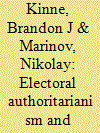

|
|
|
|
|
| Publication |
2013.
|
| Summary/Abstract |
How, if at all, do nondemocratic elections affect credible signaling in international crises? While the literature on credible signaling emphasizes the importance of electoral competition, it does not specify the minimal conditions that elections must satisfy in order to enhance the credibility of threats. We address this oversight by focusing on two fundamental properties of electoral institutions: (1) the degree of proincumbent bias and (2) the vulnerability of the incumbent to a de facto loss of power following an opposition victory. Our theory argues that both decreases in electoral bias and increases in incumbent vulnerability introduce greater accountability into the electoral process and thus enhance the credibility of public threats, even when elections fail to meet basic democratic standards. We apply these insights to the case of electoral authoritarianism, that is, regimes in which some form of electoral competition exists but basic principles of democratic governance are commonly violated. Using data on reciprocation rates in militarized crises, We show that, so long as electoral biases are sufficiently low and incumbent vulnerability is sufficiently high, even electoral authoritarian regimes are able to credibly signal resolve.
|
|
|
|
|
|
|
|
|
|
|
|
|
|
|
|
| 7 |
ID:
191916


|
|
|
|
|
| Summary/Abstract |
How do states distribute the burdens of collective defense? This paper develops a network theory of burden sharing. We focus on bilateral defense cooperation agreements (DCAs), which promote cooperation in a variety of defense, military, and security issue areas. Using a computational model, we show that DCA partners’ defense spending depends on the network structure of their agreements. In bilateral terms, DCAs increase defense spending by committing states to defense activities and allowing partners to reciprocally punish free riding. However, as a state's local network of defense partnerships grows more densely connected, with many transitive “friend of a friend” relations, DCAs have the countervailing effect of reducing defense spending. The more deeply integrated states are in bilateral defense networks, the less they spend on defense. We distinguish two potential mechanisms behind this effect—one based on efficiency improvements, the other on free riding. An empirical analysis using multilevel inferential network models points more to efficiency than to free riding. Defense networks reduce defense spending, and they do so by allowing countries to produce security more efficiently.
|
|
|
|
|
|
|
|
|
|
|
|
|
|
|
|
| 8 |
ID:
124976


|
|
|
|
|
| Publication |
2013.
|
| Summary/Abstract |
Existing studies of intergovernmental organizations (IGOs) and militarized conflict focus on dyadic counts of shared IGO membership. However, dyadic approaches are inconsistent with the basic properties of IGOs. Because IGOs are multilateral organizations, shared membership necessarily involves ties to third parties. This article employs network analytics to develop a novel explanation of how third-party IGO ties reduce militarized conflict. The analysis first examines the 'structural similarity' of states, defined by the extent to which states share similar patterns of IGO membership with relevant third parties. High levels of structural similarity indicate that states interact with a common set of IGO collaborators. The analysis then shows that micro-level changes in IGO membership effect changes in structural similarity, leading to the macro-level phenomenon of 'network convergence,' wherein states increasingly collaborate with the same third parties over time. Substantively, convergence results in increased overlap and integration between states' respective local networks of IGO partners. Because network convergence is costly, involving a combination of IGO-based accession, sovereignty, and alignment costs, it is unlikely to be pursued by purely exploitative state types. Consequently, convergence provides cooperative types with a mechanism for signaling a preference for cooperation over conflict. These credible signals in turn establish mutual trust among cooperators and effectively reduce the risk of militarized conflict. Extensive empirical analysis shows that, in fact, network convergence strongly correlates with a decline in militarized dispute initiations. The more that states collaborate with one another's IGO partners, the less likely they are to fight.
|
|
|
|
|
|
|
|
|
|
|
|
|
|
|
|
| 9 |
ID:
127833
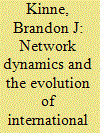

|
|
|
|
|
| Publication |
2013.
|
| Summary/Abstract |
Cooperation helps states realize mutual gains, but mistrust and disagreements over institutional design inhibit cooperation. This article develops a network explanation for how states achieve cooperation in the face of persistent coordination and collaboration problems. The analysis focuses on bilateral cooperation agreements, a vast body of treaties spanning multiple issue areas. Bilateral agreements constitute an evolving network of cooperative ties. This network defines the strategic environment in which states bargain over new agreements, endogenously influencing subsequent bilateral endeavors by revealing strategically valuable information about states' trustworthiness and preferences over institutional design, while also generating externalities that incentivize bilateral partnerships. Inferential network analysis shows that states are more likely to create bilateral agreements if they (1) share agreements with common third parties, (2) accede to more agreements in general, and/or (3) share important exogenous characteristics with current bilateral partners. These network dynamics drive bilateral cooperation in everything from commodities to cultural exchange to fisheries.
|
|
|
|
|
|
|
|
|
|
|
|
|
|
|
|
|
|
|
|
|